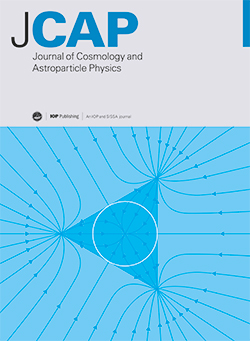Formation and decay of oscillons after inflation in the presence of an external coupling. Part I. Lattice simulations
IF 5.3
2区 物理与天体物理
Q1 ASTRONOMY & ASTROPHYSICS
Journal of Cosmology and Astroparticle Physics
Pub Date : 2024-10-24
DOI:10.1088/1475-7516/2024/10/082
引用次数: 0
Abstract
We investigate the formation and decay of oscillons during the post-inflationary reheating epoch from inflaton oscillations around asymptotically flat potentials V(φ) in the presence of an external coupling of the form 1/2 g2φ2χ2. It is well-known that in the absence of such an external coupling, the attractive self-interaction term in the potential leads to the formation of copious amounts of long-lived oscillons both for symmetric and asymmetric plateau potentials. We perform a detailed numerical analysis to study the formation of oscillons in the α-attractor E- and T-model potentials using the publicly available lattice simulation code CosmoLattice. We observe the formation of nonlinear oscillon-like structures with the average equation of state ⟨wφ⟩ ≃ 0 for a range of values of the inflaton self-coupling λ and the external coupling g2. Our results demonstrate that oscillons form even in the presence of an external coupling and we determine the upper bound on g2 which facilitates oscillon formation. We also find that eventually, these oscillons decay into the scalar inflaton radiation as well as into the quanta of the offspring field χ. Thus, we establish the possibility that reheating could have proceeded through the channel of oscillon decay, along with the usual decay of the oscillating inflaton condensate into χ particles. For a given value of the self-coupling λ, we notice that the lifetime of a population of oscillons decreases with an increase in the strength of the external coupling, following an (approximately) inverse power-law dependence on g2.存在外部耦合的膨胀后振子的形成和衰变。第一部分:晶格模拟
我们研究了在存在1/2 g2φ2χ2形式的外部耦合的情况下,胀大后再热纪元期间围绕渐近平坦势V(φ)的胀大振荡所产生的振子的形成和衰变。众所周知,在没有这种外部耦合的情况下,无论是对称还是不对称的高原势,势中的吸引力自相互作用项都会导致大量长寿命振子的形成。我们使用公开的晶格模拟代码 CosmoLattice 进行了详细的数值分析,以研究在 α-attractor E- 和 T-模型势中振子的形成。我们观测到了非线性振子样结构的形成,其平均状态方程⟨wφ⟩ ≃0适用于一系列膨胀子自耦合λ和外部耦合g2的值。我们的结果表明,即使存在外部耦合,振子也会形成,我们还确定了有利于振子形成的 g2 上限。我们还发现,这些振子最终会衰变为标量inflaton辐射以及子场χ的量子。因此,我们确定了再热可能是通过振子衰变的渠道进行的,同时振荡的inflaton凝聚态通常也会衰变成χ粒子。对于给定的自耦合 λ 值,我们注意到振子群的寿命随着外部耦合强度的增加而减小,与 g2 呈(近似)反幂律关系。
本文章由计算机程序翻译,如有差异,请以英文原文为准。
求助全文
约1分钟内获得全文
求助全文
来源期刊

Journal of Cosmology and Astroparticle Physics
地学天文-天文与天体物理
CiteScore
10.20
自引率
23.40%
发文量
632
审稿时长
1 months
期刊介绍:
Journal of Cosmology and Astroparticle Physics (JCAP) encompasses theoretical, observational and experimental areas as well as computation and simulation. The journal covers the latest developments in the theory of all fundamental interactions and their cosmological implications (e.g. M-theory and cosmology, brane cosmology). JCAP''s coverage also includes topics such as formation, dynamics and clustering of galaxies, pre-galactic star formation, x-ray astronomy, radio astronomy, gravitational lensing, active galactic nuclei, intergalactic and interstellar matter.
 求助内容:
求助内容: 应助结果提醒方式:
应助结果提醒方式:


